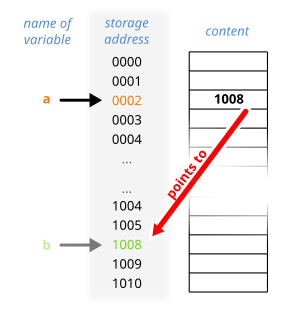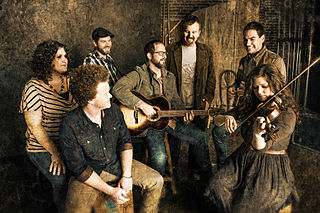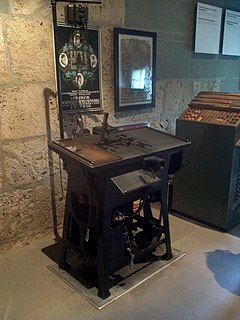Pipe(s) or PIPE(S) may refer to:

In printing, type metal refers to the metal alloys used in traditional typefounding and hot metal typesetting. Historically, type metal was an alloy of lead, tin and antimony in different proportions depending on the application, be it individual character mechanical casting for hand setting, mechanical line casting or individual character mechanical typesetting and stereo plate casting. The proportions used are in the range: lead 50‒86%, antimony 11‒30% and tin 3‒20%. Antimony and tin are added to lead for durability while reducing the difference between the coefficients of expansion of the matrix and the alloy. Apart from durability, the general requirements for type-metal are that it should produce a true and sharp cast, and retain correct dimensions and form after cooling down. It should also be easy to cast, at reasonable low melting temperature, iron should not dissolve in the molten metal, and mould and nozzles should stay clean and easy to maintain. Today, Monotype machines can utilize a wide range of different alloys. Mechanical linecasting equipment uses alloys that are close to eutectic.
Plug, PLUG, plugs, or plugged may refer to:

In computer science, a pointer is an object in many programming languages that stores a memory address. This can be that of another value located in computer memory, or in some cases, that of memory-mapped computer hardware. A pointer references a location in memory, and obtaining the value stored at that location is known as dereferencing the pointer. As an analogy, a page number in a book's index could be considered a pointer to the corresponding page; dereferencing such a pointer would be done by flipping to the page with the given page number and reading the text found on that page. The actual format and content of a pointer variable is dependent on the underlying computer architecture.
In computer science, type conversion, type casting, type coercion, and type juggling are different ways of changing an expression from one data type to another. An example would be the conversion of an integer value into a floating point value or its textual representation as a string, and vice versa. Type conversions can take advantage of certain features of type hierarchies or data representations. Two important aspects of a type conversion are whether it happens implicitly (automatically) or explicitly, and whether the underlying data representation is converted from one representation into another, or a given representation is merely reinterpreted as the representation of another data type. In general, both primitive and compound data types can be converted.
In film, television, and theatre, typecasting is the process by which a particular actor becomes strongly identified with a specific character, one or more particular roles, or characters having the same traits or coming from the same social or ethnic groups. There have been instances in which an actor has been so strongly identified with a role as to make it difficult for them to find work playing other characters.

In printing and typography, hot metal typesetting is a technology for typesetting text in letterpress printing. This method injects molten type metal into a mold that has the shape of one or more glyphs. The resulting sorts or slugs are later used to press ink onto paper. Normally the typecasting machine would be controlled by a keyboard or by a paper tape.
A cookie is a baked or cooked good that is small, flat and sweet

Casting Crowns is a contemporary Christian and Christian rock band started in 1999 by youth pastor Mark Hall, who serves as the band's lead vocalist, as part of a youth group at First Baptist Church in Downtown Daytona Beach, Florida. They later moved to Stockbridge, Georgia, and more members joined. Some members of the band currently work as ministers for Eagle's Landing First Baptist Church in McDonough, Georgia. The band has won a Grammy and a Dove Award.
A foundry is a factory that produces metal castings.
Theo Rehak is a typefounder and the author of Practical Typecasting (ISBN 0-938768-33-6), The Fall of ATF; a Serio-Comedic Tragedy and co-author of The Music and Life of Theodore "Fats" Navarro" (ISBN 0-8108-6721-4). He is one of the few remaining craftsmen in the field of metal typefounding. Rehak was the last person trained at American Type Founders before their 1993 bankruptcy. He formed The Dale Guild Type Foundry in 1994, purchasing a significant portion of ATF equipment at the firm's liquidation auction. He is also an historian and has assisted museums, including The Smithsonian, around the world in creating exhibits and demonstrating printing technologies.
Typecast is a Filipino emo rock band from the Philippines. Originally an underground act, they have surfaced on the mainstream Philippine music scene, while managing to hold on to their underground roots..

A Ludlow Typograph is a hot metal typesetting system used in letterpress printing. The device casts bars, or slugs of type, out of type metal primarily consisting of lead. These slugs are used for the actual printing, and then are melted down and recycled on the spot. It was used to print large-type material such as newspaper headlines or posters.

Type casting is a technique for casting the individual letters known as sorts used in hot metal typesetting by pouring molten metal into brass moulds called matrices.
Stunt casting is a term in casting that refers to the use of a gimmick or publicity stunt to fill a role in a television series, film or theatre production. Stunt casting can take many forms, ranging from a celebrity or famous non-actor cameo appearance to the use of an actor's real-life relatives to play the corresponding fictional character's relatives or younger or older versions of the same character.
This page is based on this
Wikipedia article Text is available under the
CC BY-SA 4.0 license; additional terms may apply.
Images, videos and audio are available under their respective licenses.





